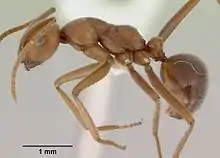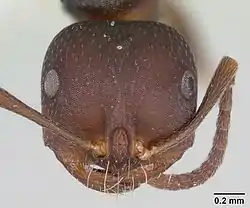| Melophorus | |
|---|---|
 | |
| Melophorus anderseni worker | |
| Scientific classification | |
| Domain: | Eukaryota |
| Kingdom: | Animalia |
| Phylum: | Arthropoda |
| Class: | Insecta |
| Order: | Hymenoptera |
| Family: | Formicidae |
| Subfamily: | Formicinae |
| Tribe: | Melophorini |
| Genus: | Melophorus Lubbock, 1883 |
| Type species | |
| Melophorus bagoti Lubbock, 1883 | |
| Diversity[1] | |
| 23 species | |
| Synonyms | |
|
Erimelophorus Wheeler, 1935 | |

Head view of ant Melophorus majeri specimen
Melophorus (meaning "honey carrier")[2] is a genus of ants in the subfamily Formicinae.[3] The genus is endemic to Australia, where its species are common in arid and semiarid areas.[4]
Species
- Melophorus aeneovirens (Lowne, 1865)
- Melophorus anderseni Agosti, 1998
- Melophorus bagoti Lubbock, 1883
- Melophorus biroi Forel, 1907
- Melophorus bruneus McAreavey, 1949
- Melophorus constans Santschi, 1928
- Melophorus curtus Forel, 1902
- Melophorus fieldi Forel, 1910
- Melophorus fulvihirtus Clark, 1941
- Melophorus hirsutus Forel, 1902
- Melophorus insularis Wheeler, 1934
- Melophorus iridescens (Emery, 1887)
- Melophorus laticeps Wheeler, 1915
- Melophorus ludius Forel, 1902
- Melophorus majeri Agosti, 1998
- Melophorus marius Forel, 1910
- Melophorus mjobergi Forel, 1915
- Melophorus omniparens Forel, 1915
- Melophorus pillipes Santschi, 1919
- Melophorus potteri McAreavey, 1947
- Melophorus scipio Forel, 1915
- Melophorus turneri Forel, 1910
- Melophorus wheeleri Forel, 1910
See also
References
- ↑ Bolton, B. (2014). "Melophorus". AntCat. Retrieved 4 July 2014.
- ↑ Schultheiss, P.; Schwarz, S.; Wystrach, A. (2010). "Nest Relocation and Colony Founding in the Australian Desert Ant, Melophorus bagoti Lubbock (Hymenoptera: Formicidae)". Psyche: A Journal of Entomology. 2010: 1–4. doi:10.1155/2010/435838.
- ↑ "Genus: Melophorus". antweb.org. AntWeb. Retrieved 23 September 2013.
- ↑ Schultheiss, P.; Schwarz, S.; Cheng, K.; Wehner, R. D. (2012). "Foraging ecology of an Australian salt-pan desert ant (genus Melophorus)". Australian Journal of Zoology. 60 (5): 311. doi:10.1071/ZO12096. S2CID 86050964.
External links
 Media related to Melophorus at Wikimedia Commons
Media related to Melophorus at Wikimedia Commons
This article is issued from Wikipedia. The text is licensed under Creative Commons - Attribution - Sharealike. Additional terms may apply for the media files.